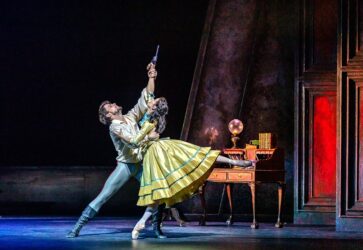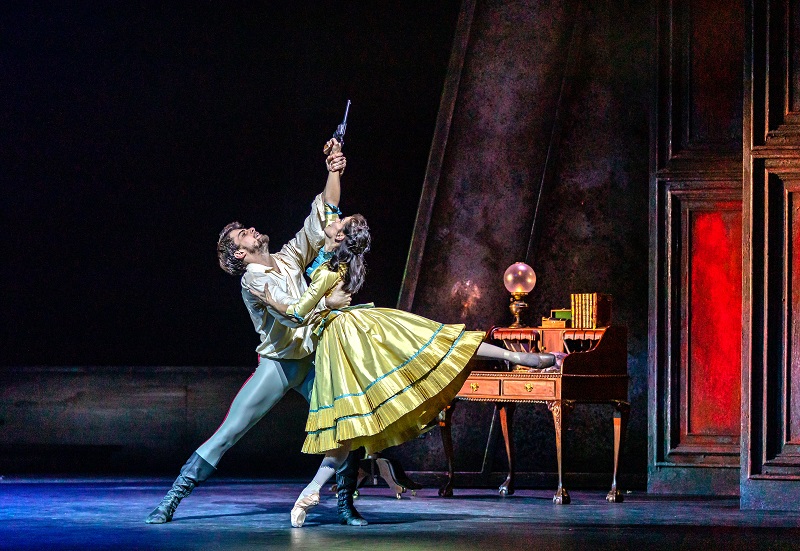 United Kingdom Scottish Ballet’s The Scandal at Mayerling: Dancers of Scottish Ballet, Orchestra of Scottish Ballet / Jean-Claude Picard (conductor). Edinburgh Festival Theatre, 25.5.2022. (SRT)
United Kingdom Scottish Ballet’s The Scandal at Mayerling: Dancers of Scottish Ballet, Orchestra of Scottish Ballet / Jean-Claude Picard (conductor). Edinburgh Festival Theatre, 25.5.2022. (SRT)

Production:
Original Choreography – Sir Kenneth MacMillan
Developed in association with Lady Deborah MacMillan
Adapted for Scottish Ballet by Christopher Hampson and Gary Harris
Staging and Direction – Gary Harris
Original scenario – Gillian Freeman
Set and Costume design – Elin Steele
Lighting design – Paul Pyant
Video design – Hayley Egan
Cast:
Crown Prince Rudolf – Evan Loudon
Mary Vetsera – Sophie Martin
Princess Stephanie – Constance Devernay
Countess Larisch – Roseanna Leney
Empress Elizabeth – Marge Hendrick
Bratfisch – Bruno Micchiardi
It is tempting to declare the canon of classical ballet, never a particularly large corpus, to be closed after the death of Prokofiev. As early as the 1960s, contemporary dance seems to kick in, and there are precious few works (so far) that could feasibly claim the status of a classic in the repertoire of a major ballet company alongside Sleeping Beauty, Coppélia or Cinderella.
Sir Kenneth MacMillan is pretty much the only choreographer I can think of who even comes close to bucking that trend. His ballets, like Manon or Anastasia, are large-scale narrative works that fill an evening and pack in the crowds; old fashioned without being old hat.
So, too, is Mayerling, his 1978 work for the Royal Ballet, telling the story of the doomed Habsburg Crown Prince Rudolf and his murder/suicide pact with his lover, Mary Vetsera. Its only UK performances so far have been at the Royal Opera House in London, but this Scottish Ballet production has broken new ground for the piece, and not just because of its location. MacMillan’s original is splendid, opulent and long; not particularly well suited for touring, but certainly worth seeing outside of the M25. So Scottish Ballet’s Artistic Director, Christopher Hampton, together with director Gary Harris and with the collaboration of Lady Deborah MacMillan, has created The Scandal at Mayerling, a reimagined version of the original; not a reduction but a refocusing, according to Hampton’s notes in the programme. It cuts some scenes and reduces the ballet from three acts to two, but that concentrates its power and allows it to deliver its aesthetic and dramatic punch in an intense two hours (including an interval).
It is enormously compelling to look at, as well as to hear. Elin Steele’s sets are as open as they need to be for the dance to draw the eye, but quietly sumptuous in their suggestion of place, with some clever projections onto the gauze curtain for specific locales. MacMillan’s choreography seems to come up newly minted, each scene bristling with life so that even the mime becomes highly expressive. The crowd scenes are all carefully delineated too, from the dainty refinement of the ball to the lurid tavern scene, and I loved the intimate yet chilly en pointe scene in the Empress’s bedroom, showing that even in this most private space courtly decorum must hold sway.
The cast for the first night of this Edinburgh run knew how to match MacMillan’s movements to their characters’ dramatic arc. At the centre of it all, Evan Loudon’s Rudolf is gripping to watch. His character is tortured, yes, but always muscular, exciting and hard to take your eyes off. His solo, just before the climactic death scene, is a powerful depiction of a man on the brink of collapse, though with a little too much head-clutching to suggest mental instability (are we still doing that in this day and age?!). Constance Devernay as Princess Stephanie, Rudolf’s unloved wife, is fluid, sympathetic and always beautiful, touchingly vulnerable in the wedding night scene. There is beauty mixed with peril in Sophie Martin’s remarkable Mary. Hers and Rudolf’s dangerous entwining carries all the erotic charge that is missing from Rudolf’s dances with his wife, and she becomes a character who we can pity in her race to the abyss while simultaneously sympathizing with her infatuation.
The music is by Liszt, tastefully orchestrated by Martin Yates and played heroically by the musicians of Scottish Ballet’s orchestra in repertoire that is a long way from their regular diet. The Faust Symphony does a lot of the heavy lifting, but its gloomy atmosphere and its doomed subject material make it a very effective fit. The score is tailored well to the scenario, too: the final pas de deux fits the music particularly well, as does the dull, throbbing drum heartbeat for the final suicide. Jean-Claude Picard, the company’s music director, shapes it with power and punch.
This is a powerful evening at the ballet, something that deserves to stay in Scottish Ballet’s repertoire for many future revivals. You might even call it a classic.
Simon Thompson
At the Edinburgh Festival Theatre until 28th May.
